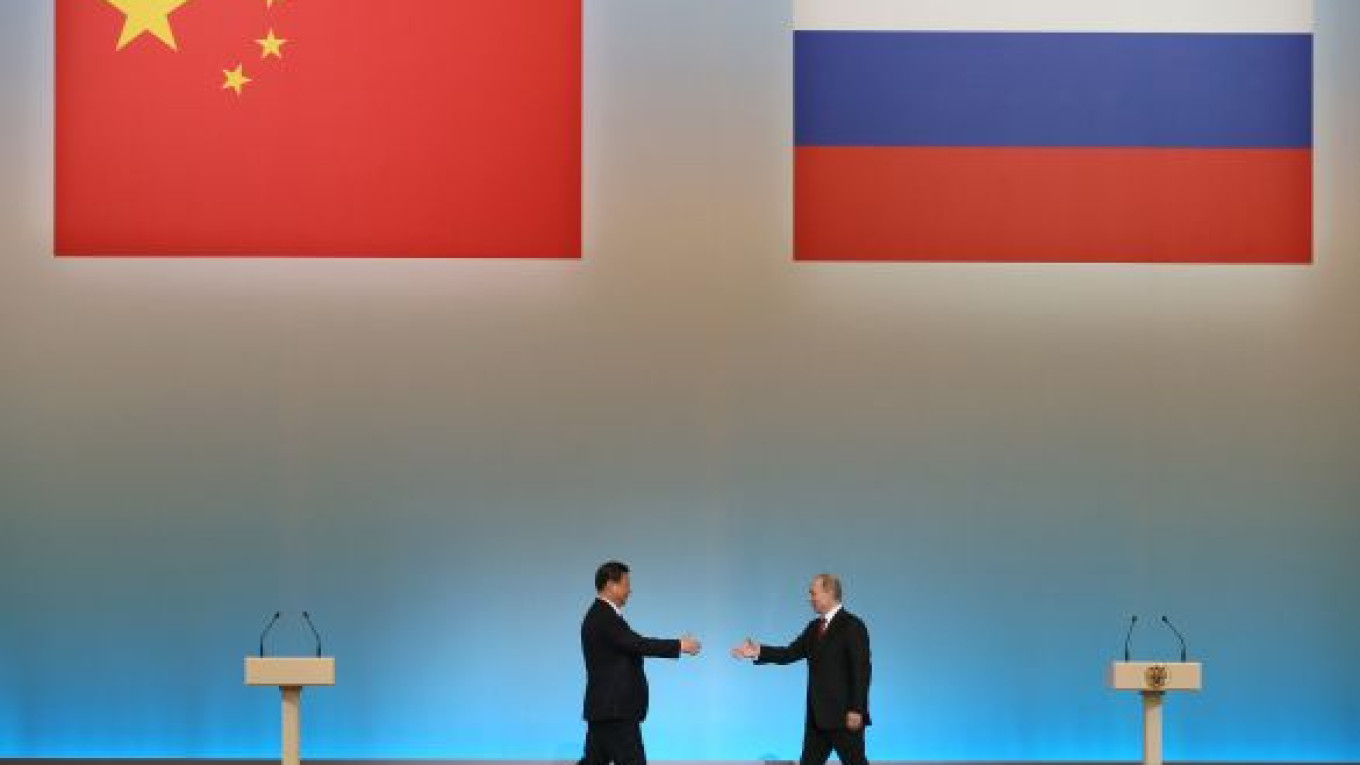In a veiled criticism of the U.S., new Chinese President Xi Jinping has denounced foreign governments that meddle in the domestic affairs of other countries, adopting rhetoric favored by President Vladimir Putin as he wrapped up his first foreign trip in Moscow.
Xi, who underscored China's intentions to pursue a closer strategic partnership with Russia during his two-day visit, which ended Saturday, also oversaw the signing of 35 agreements, many of which focused on energy.
"We must respect the right of each country in the world to independently choose its path of development and oppose interference in the internal affairs of other countries," Xi said Saturday during a speech at the Moscow State Institute of International Relations, news agencies reported.
The school, known as MGIMO, is a training ground for future diplomats and includes former Foreign Minister Igor Ivanov among its professors.
While the Chinese president did not mention any country by name, both China and Russia, permanent UN Security Council members with veto power, have opposed the influence of the U.S. and NATO and have blocked three draft resolutions on Syria.
"The Chinese-Russian relationship is among the most important bilateral relationships in the world. Not only does it correspond to our interests, but it also guarantees the world balance," Xi said.
During his visit, Xi also met with President Vladimir Putin and Prime Minister Dmitry Medvedev. The Chinese President spent seven hours with Putin, calling their meeting "productive." Xi described Putin as his "old, good friend" and said the decision to make Russia his first foreign visit was a sign of the "strong and special nature" of Chinese-Russian ties.
Xi and Putin affirmed their intention to champion nonintervention and multipolarity on an international level.
Both country's presidents presided over the signing ceremony of a memorandum between Gazprom and Chinese CNPC to supply gas to China. The project, expected to start in 2018, will see Russia supply 38 billion cubic meters of gas annually, with a possibility to increase the amount up to 60 billion bcm, Gazprom chief Alexei Miller said.
The two sides also signed agreements to cooperate on the construction of an oil refinery in the Chinese port city of Tianjin.
Igor Sechin, chief of the state-controlled Rosneft, said the company would boost oil deliveries. "We could achieve a level of 50 million tons," he told Rossia-24 television on Saturday, referring to annual deliveries.
Sechin said the company currently supplies 15 million tons of oil annually to China, which desperately needs energy for its growing economy.
On Friday, Rosneft signed an agreement with the Chinese Development Bank for an additional loan of $2 billion for oil exports over a 25-year period. In 2009, Rosneft received a $25 billion loan under a separate agreement with the Chinese side.
Another deal, worth $2 billion, was concluded by En+ Group, Shenhua Group and China Development Bank to develop coal resources in eastern Russia, En+ Group said Friday.
Bilateral trade rose 11.2 percent last year, hitting a record high of $88.2 billion, and Xi's visit was accompanied by a pledge to increase trade to $100 billion by 2015 and $200 billion by 2020, a statement on the Kremlin's website said. China is already Russia's largest trading partner.
Russia and China, which during the Soviet times engaged in a short-lived military conflict in a border dispute over the Damansky island, now describe their relationship as strategic. Both countries have joined forces against foreign intervention in Syria's bloody civil war and pushed for restraint in addressing Iran's and North Korea's nuclear ambitions, positions that have often put them at loggerheads with the U.S. and its European allies.
Xi emphasized while meeting with Putin on Friday that "political support will be increased" as relations continue to improve.
Theodore Karasik, an analyst with the Dubai-based Enigma think tank, said security interests, such as what will happen after U.S.-led forces withdraw from Afghanistan next year, play a key role in the relationship between the two countries.
"Although the Shanghai Cooperation Organization is just beginning to function, by 2015, the organization must be a buttress against any threats from the south," he said, referring to the Russia- and China-led security body.
Contact the authors at a.bratersky@imedia.ru and j.earle@imedia.ru
Related articles:
A Message from The Moscow Times:
Dear readers,
We are facing unprecedented challenges. Russia's Prosecutor General's Office has designated The Moscow Times as an "undesirable" organization, criminalizing our work and putting our staff at risk of prosecution. This follows our earlier unjust labeling as a "foreign agent."
These actions are direct attempts to silence independent journalism in Russia. The authorities claim our work "discredits the decisions of the Russian leadership." We see things differently: we strive to provide accurate, unbiased reporting on Russia.
We, the journalists of The Moscow Times, refuse to be silenced. But to continue our work, we need your help.
Your support, no matter how small, makes a world of difference. If you can, please support us monthly starting from just $2. It's quick to set up, and every contribution makes a significant impact.
By supporting The Moscow Times, you're defending open, independent journalism in the face of repression. Thank you for standing with us.
Remind me later.


